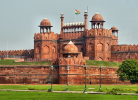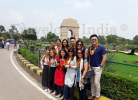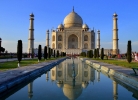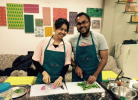Top Festivals in Delhi
India is a land of festivals. There are a myriad cultures co-existing with each other on the same land which have made India set a perfect example of Unity in Diversity in front of the whole world. This mixture of varied cultures and traditions is seen in Delhi as it is the capital city of India. There are a number of festivals celebrated with great fervour and vigour in Delhi so we bring to you a list of festivals that you should witness whenever you are in here:
1. Diwali
This is also called as the ‘festival of lights’ and is celebrated either in the month of October or November. It is celebrated on the occasion of home-coming of Lord Rama after fourteen years of exile. Being considered as the principal Hindu festival, people decorate their homes with lights and flowers; they make up rangolis and light up fire crackers, diyas (earthen lamps) and candles. The whole country looks like a newly-wed bride on this day. Exchanging gifts and worshipping Goddess Lakshmi and Lord Ganesha are a part of traditional festivities on Diwali.
2. Eid
Eid is the principal festival of Muslims and is celebrated two times a year, known by the names of Eid-Ul-Zuha and Eid-Ul-Fitr. Eid-Ul-Zuha has great religious importance for Muslims and is also called Bakrid. On this festival goats are sacrificed and the meat is distributed to all. The underlying idea behind doing this is the sacrifice of all evil lying within. On the other hand, Eid-Ul-Fitr is celebrated in the month of Ramzan, the holy month for Muslims. They observe strict fasts during this month and at the conclusion day Eid is celebrated, special prayers are offered, gifts are exchanged and a dessert called ‘Sewaiyan’ is made.
3. Holi
This is the festival of colours and people are seen soaked in powder and liquid colours from head to toe. There are various legends associated with it but the principal legend says that Holi is celebrated to commemorate the victory of good over evil as on this day when Holika attempted to burn baby Prahlad, she herself got burnt. On the eve of Holi, fire is worshipped. Children enjoy this festival greatly as they play with pichkaris (water guns) and water balloons.
4. Navratri and Dussehra
This is the festival that continues to be celebrated for nine days. On each day a different form of Goddess Durga is worshipped. Gujarati people host community dance programs where people come dressed up in ghagra-choli and . They all dance in pairs brimming with energy and excitement using decorated wooden sticks (called as dandiya). On ninth day people worship little girls in their homes whom they regard as different avatars of Goddess Durga. Tenth day after the conclusion of Navratri is Dussehra when the effigies of demons ‘Ravana’, ‘Kumbhakarana’ and ‘Meghnatha’ are burnt to symbolise victory of good over evil.
5. Durga Puja
Over the whole of Delhi, Durga Puja is celebrated by Bengalis with exuberance. It commences from sixth day of Navratri. On every day, Ma Durga is worshipped with great veneration and cultural programs are conducted besides the Pujo Pandal. You can roam around and find beautifully decorated Durga idols in different pandals across the CR Park area (also called Mini Bengal). People enjoy food and festivities all through these four days and on the last day i.e. Vijay Dashami, Durga Ma’s idol is immersed in a holy river. She is bid a hearty farewell to be welcomed next year again.
6. Guru Nanak Jayanti
Guru Nanak Jayanti is celebrated on the occasion of birth anniversary of Guru Nanak Dev, the founder of Sikh religion. It starts with an early morning procession after which people listen to shabad kirtan in the Gurudwara. Devotees decorate their homes with lights and candles on this festival.
7. Lohri
Celebrated by Punjabis and Hindus on 13th January, this festival is celebrated by lighting bonfire. People dance around the bonfire and throw popcorns, groundnuts, sesame seeds etc in the fire. Performing Bhangra and gidda (the traditional dances of Punjab) is a part of the festivities in Lohri. It has great importance in Punjabi households as the first Lohri after a baby’s birth or a couple is married is celebrated with much joy.
8. Independence Day
15th August is observed as the Independence Day in India as on this day (1947) India was freed from the long endured chains of suppressive British Rule. The Prime Minister of India addresses the public from Red Fort after which he proceeds to hoist the National Flag. Independence Day Parade of policemen and armed forces follows soon after this. This day is a national holiday in India.
9. Republic Day
Republic day is celebrated on 26th January every year in India. It is on this day that India’s constitution came into being. There is a grand function organised on this day which sees President addressing the nation followed with the armed forces marching on Rajpath and Vijaypath. Delhi welcomes a top foreign official every year as the chief guest in this function. An added factor to this function is the showcase of culture of various states through jhankis moving in a procession like fashion.
















